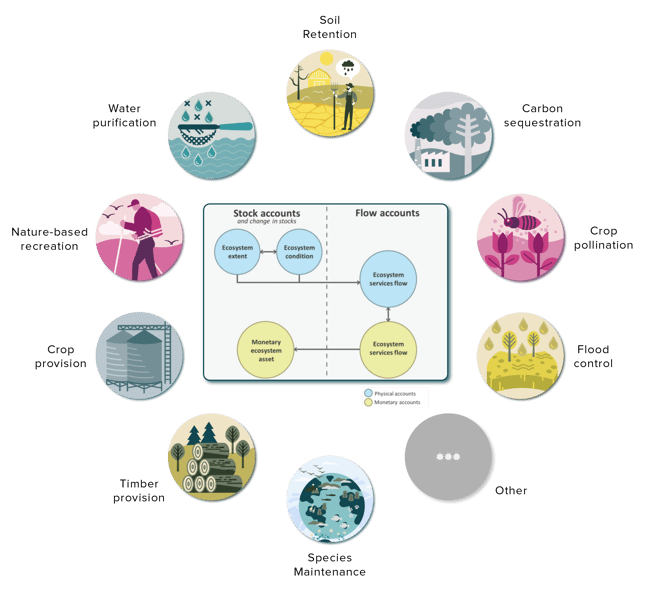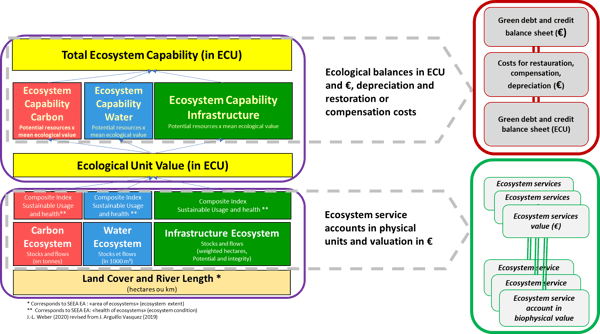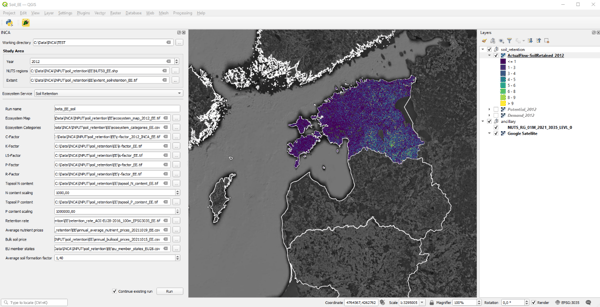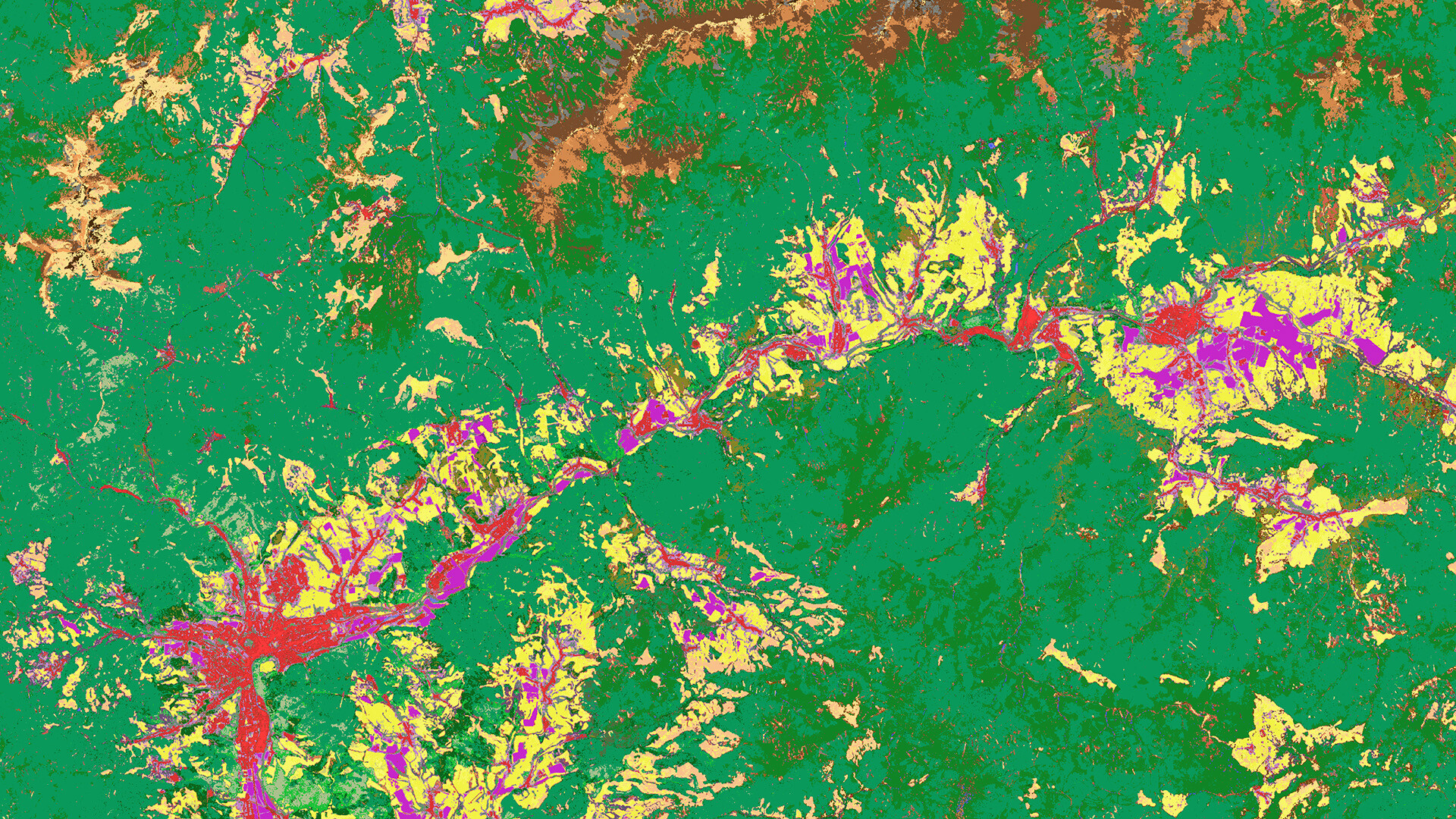Accounting our environment's contribution to the economy
Natural Capital Accounting (NCA) is the process of calculating the stocks and flows of our natural resources and services in a given ecosystem or region. Accounting for such goods can occur in physical and monetary terms and hence complements economic indicators as Gross Domestic Product (GDP). In March 2021 the United Nations released the System of Environmental Economic Accounts for Environmental Accounting (SEEA-EA), and is urging member states and private organisations to start implementing it. SEEA is being recognized as an information system to support other initiatives as Sustainable Development Goals (SDG), Climate Change Initiative, Convention of Biological Diversity and others. It integrates the environment’s contribution to economy in a standardized statistical manner and hence can accelerate sustainable decision making processes.
Ecosystem accounting is a rapidly emerging geospatial technology that encompasses many domains, including statistics, environmental science, social science and data science. At VITO we use our geospatial and socio-economic knowledge to support and improve this technology since 2018. By developing high-quality geospatial methodologies and tools we can ease the implementation of NCA, with a prime focus to:
- support the mainstreaming of SEEA-EA in Europe
- explore its use to conserve and restore nature (i.e. for protected areas in West-Africa).
Dedicated NCA session at G-STIC 2022
Update 24/01/2022 - As an NCA ambassador and to support the acceleration on implementing NCA, we organized a dedicated session on Natural Capital Accounting at the GSTIC 2022 conference. The Global Sustainable Technology & Innovation Community (GSTIC) is a growing action- and impact-oriented global expert community that accelerates the transition to wide-scale deployment of market-ready, transformative, integrated technological solutions with significant impact on the achievements of the Climate Goals and the Sustainable Development Goal.
The NCA session was held online on January 18, 2022 and brought together experts on Natural Capital Accounting from international to local scale and from governments to private industry to discuss experiences, roadblocks and opportunities to implement the international SEEA EA standard at different scales. We want to see how it can form the basis for other sustainable initiatives in environmental reporting, green financing and decision making in general. During this session we addressed four key questions:
- Why do we need Natural Capital Accounting to accelerate the transformation into a sustainable world?
- How can NCA support (or accelerate) other sustainability reporting initiatives (i.e. SDG, CDB, UNCCD, etc.)?
- How can emerging technologies and new data streams accelerate mainstreaming Natural Capital Accounting?
- What are the bottlenecks to connect information from accounts to the needs of decision makers and to the public disclosure on the economy?
Mainstream NCA in Europe
The European Commission, led by Eurostat, has been prototyping the generation of ecosystem accounts through a Knowledge Innovation Project on Integrated System of Natural Capital Accounting (KIP-INCA), and is preparing a legislation to mainstream ecosystem accounting according to the new SEEA-EA standard for all European Member States. Together with partners Ecounting (The Netherlands), EFTEC (United Kingdom) and IDEEA Group (Australia), we were selected to provide support on Ecosystem Accounting – INCA 2021-2023, and advance the implementation of ecosystem accounts in the European Union (EU).
In 2021, we improved the KIP-INCA prototypes (originally developed by JRC) for nine ecosystem service accounts and brought them into easy-to-use tools to enable European Member States to create accounts. These tools were also used to extend the published European continental accounts series (2000-2012) to the year 2018. The tools follow the SEEA-EA standard and were focused on ecosystem services physical and monetary accounts according to the Supply-Use table principle.
 SEEA Ecosystem Account model and the INCA service flow accounts - Source: based on UN SEEA-EA framework standard and Accounting for ecosystems and their services in the European Union (INCA) – 2021 edition
SEEA Ecosystem Account model and the INCA service flow accounts - Source: based on UN SEEA-EA framework standard and Accounting for ecosystems and their services in the European Union (INCA) – 2021 edition
The European continental ecosystem account results and a Quantum Geographic Information System (QGIS) tool will be published at the European Commission INCA website in the coming months. In 2022, the tools will also be further refined to support the European legislation and its methodological guidelines, and extended to support ecosystem extent and condition accounts so certainly stay tuned for more.
Screenshot from QGIS INCA tool on Soil Retention service account for Estonia
NCA to protect nature in Africa
West Africa is characterized by rapid population growth, endemic poverty and suboptimal governance and management of natural resources. This situation, enforced by devastating effects of climate change, is unequivocally leading to the depletion of West African natural capital, including the ecosystems on which the population largely depends. The European Union, together with ECOWAS and UEMOA Commissions set up a support program in 2019 for the Preservation of Biodiversity and Fragile Ecosystems, Regional Governance and Climate Change in West Africa (PAPBio). This program is led by the International Union for Conservation of Nature (IUCN). We are proud to contribute to this program by providing a full automated platform for the Natural Capital Accounting (NCA) calculations based on the method “Ecosystem Natural Capital Accounts – Quick Start Package” (ENCA-QSP).
The ENCA-QSP method follows the basic principles of the SEEA Experimental Ecosystem Accounts (focused on stock and stock changes) with the objective to evaluate the sustainability of accountability to ecosystem use and any losses in capabilities. Capability should be understood as the sustainable capacity of ecosystems to deliver services. It is measured by weighting accounts in physical units with a composite index used as common currency of ecological value; also called Ecosystem Capability Unit (ECU).

ENCA Quick Start Package model for ecosystem accounting
The first results of the PAPBio case study confirm the high ecological values of the Niokolo transboundary Park between the Republic of Guinea and Senegal, and of the Bafing Falémé landscape with its new established Moyen Bafing National Park (2017) located in Guinea and adjacent to the Malian border. Moreover, the results show the difference in ecological value per socio-ecological landscape unit (SELU) of the protected areas and its changes over time from 2000 to 2018 (displayed as trend indicators).
Trend in ecological value per Ecosystem Account Unit (SELU) from 2000 to 2018
With such information, park managers and local authorities can identify zones to take appropriate management actions as i.e. restoring nature through planting trees, changing fire management practices, creating ecological corridors to improve biodiversity, etc. Nevertheless, VITO’s ENCA platform allows local expert detailed analysis (contributions by carbon, water, infrastructure to support functional services) by using the provided web services. The system has been setup in co-design with local experts and the results will be peer-reviewed published. Stay tuned!




%20from%202000%20to%202018_logo.jpg?width=650&name=Trend%20in%20ecological%20value%20per%20Ecosystem%20Account%20Unit%20(SELU)%20from%202000%20to%202018_logo.jpg)
/Land%20use%20model%20+%20green%20city.png)

